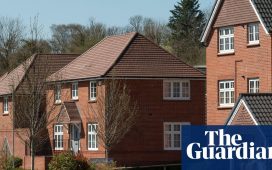Developers face tens of thousands of pounds in fines if they slow down housebuilding under new powers being granted to councils to help deliver 1.5m homes.
Under government proposals, housebuilders will need to commit to a timeframe for construction before they are granted planning permission, and deliver annual reports on their progress. Those who repeatedly fail to build or sit on land could be fined with a “delayed homes penalty” or blocked from future planning permission by councils.
Angela Rayner, the deputy prime minister and housing secretary, said the government had taken “radical steps to overhaul the planning system to get Britain building again after years of inaction.
“In the name of delivering security for working people, we are backing the builders not the blockers. Now it’s time for developers to roll up their sleeves and play their part.
“We’re going even further to get the homes we need. No more sites with planning permission gathering dust for decades while a generation struggle to get on the housing ladder.”
The plans, which form part of a government working paper on speeding up housebuilding, would apply to developments of 50 or more homes.
The prospective fines would be based on lost council tax revenue and could be imposed by councils on developers who fall at least 10% behind schedule without good reason. As a result, a developer who is failing to build 50 homes that would each raise £1,500 in annual council tax could face a £75,000 fine. This change would require new legislation and would only apply to future planning permissions.
Ministers will also test a new requirement for developments with more than 2,000 homes to include a mix of affordable and commercially sold housing by default, on the basis that this could lead to faster construction.
The government has introduced legislation to speed up planning decisions and boost housebuilding by removing avenues for legal challenges and reforming the compulsory purchase order process.
Labour committed in its manifesto to deliver 1.5m homes during this parliament, which ministers have admitted is a challenging target. However, the Office for Budget Responsibility estimated this spring that housebuilding would rise to its highest level in 40 years and contribute to the UK’s economic growth.
The government has committed £2bn for 18,000 new social and affordable homes, £1.29bn for the warm homes social housing fund, £800m in top-ups to the current affordable homes programme, and £2bn for regeneration projects that the government says will add to the total number of available homes. A further £600m will deliver training for new construction jobs.
The Telegraph reported on Friday that Rayner is pushing for further investment in social housing as part of next month’s spending review, which will set departmental budgets for several years.
Rayner has spoken about her belief in the need for more social housing. She told a conference in November that she wanted to remove the “shackles of stigma” that is too often associated with social housing.
“This is personal for me,” Rayner said. “Because I know that a secure, affordable home is not a luxury or simply nice to have. It’s the foundation on which everything else is built. When I was growing up, we didn’t have a lot, but we had a safe and secure council home. And later, when I needed a home to raise my son, I was given my own council home. I haven’t got to where I am today in spite of coming from a council house, but because of it.”










